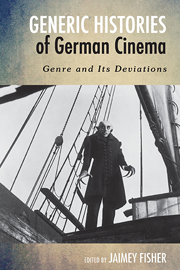Book contents
- Frontmatter
- Contents
- Acknowledgments
- Introduction: Toward Generic Histories—Film Genre, Genre Theory, and German Film Studies
- 1 Parallel Modernities: From Haunted Screen to Universal Horror
- 2 The Essay Film and Its German Variations
- 3 The Limits of Futurity: German Science-Fiction Film over the Course of Time
- 4 The Situation Is Hopeless, but Not Desperate: UFA's Early Sound Film Musicals
- 5 Resisting the War (Film): Wicki's “Masterpiece” Die Brücke and Its Generic Transformations
- 6 Ironizing Identity: The German Crime Genre and the Edgar Wallace Production Trend of the 1960s
- 7 From Siodmak to Schlingensief: The Return of History as Horror
- 8 Producing Adaptations: Bernd Eichinger, Christiane F., and German Film History
- 9 Exceptional Thrills: Genrification, Dr. Mabuse, and Das Experiment
- 10 The Heimat Film in the Twenty-First Century: Negotiating the New German Cinema to Return to Papas Kino
- 11 The Romantic Comedy and Its Other: Representations of Romance in German Cinema since 1990
- 12 Yearning for Genre: The Films of Dominik Graf
- Bibliography
- Notes on the Contributors
- Index
4 - The Situation Is Hopeless, but Not Desperate: UFA's Early Sound Film Musicals
Published online by Cambridge University Press: 05 December 2013
- Frontmatter
- Contents
- Acknowledgments
- Introduction: Toward Generic Histories—Film Genre, Genre Theory, and German Film Studies
- 1 Parallel Modernities: From Haunted Screen to Universal Horror
- 2 The Essay Film and Its German Variations
- 3 The Limits of Futurity: German Science-Fiction Film over the Course of Time
- 4 The Situation Is Hopeless, but Not Desperate: UFA's Early Sound Film Musicals
- 5 Resisting the War (Film): Wicki's “Masterpiece” Die Brücke and Its Generic Transformations
- 6 Ironizing Identity: The German Crime Genre and the Edgar Wallace Production Trend of the 1960s
- 7 From Siodmak to Schlingensief: The Return of History as Horror
- 8 Producing Adaptations: Bernd Eichinger, Christiane F., and German Film History
- 9 Exceptional Thrills: Genrification, Dr. Mabuse, and Das Experiment
- 10 The Heimat Film in the Twenty-First Century: Negotiating the New German Cinema to Return to Papas Kino
- 11 The Romantic Comedy and Its Other: Representations of Romance in German Cinema since 1990
- 12 Yearning for Genre: The Films of Dominik Graf
- Bibliography
- Notes on the Contributors
- Index
Summary
Beyond the Haunted Screen
“The weimar cinema has never been a particularly popular cinema,” writes Thomas Elsaesser. “It has always been something of a filmmaker's or a film scholar's cinema.” In this assessment, the films made in the Weimar Republic stand out above all by dint of the formal accomplishment and intellectual appeal of “individually authored art films.” Commentators who share this persuasion applaud the masterpieces of Ernst Lubitsch, Fritz Lang, F. W. Murnau, and G. W. Pabst and focus on the mean streets, dread spaces, and eccentric narratives of what Lotte Eisner called “the haunted screen,” from Das Cabinet des Dr. Caligari (The Cabinet of Dr. Caligari, 1920), Nosferatu (1922), and Dr. Mabuse, der Spieler (Dr. Mabuse, the Gambler, 1922) to Metropolis (1927) and Die Büchse der Pandora (Pandora's Box, 1928) along with other films of the fantastic, street films, chamber room melodramas, and big-city symphonies. The hallmarks of the silent era have without a doubt played a much more estimable role in the history of German cinema than the productions made after the coming of sound and the Nazi takeover. Despite its unquestionable veracity, this argument has also unwittingly helped to foster a partial and occluded view. A more inclusive approach would want to consider, along with the period's canonized productions, its less well-known genre films.
- Type
- Chapter
- Information
- Generic Histories of German CinemaGenre and its Deviations, pp. 91 - 108Publisher: Boydell & BrewerPrint publication year: 2013



